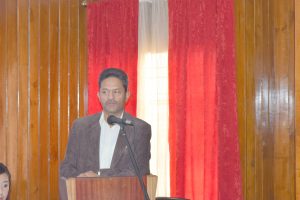Nagaland
Cultural laws, although important, have gaps — DGP
‘One cannot use an old custom to solve a modern problem’

Kohima Bureau
Kohima, April 14 (EMN): Although “customary law” is a very important part of modern law and has contributed to it to a large extent, they still are rudimentary and have gaps. This aspect needs to be addressed, the director general of Nagaland Police (DGP) Rupin Sharma has said.
DGP Rupin Sharma was addressing an event of the Nagaland State Legal Services Authority (NSLSA), a meeting of master trainers, lawyers and panel lawyers, in Kohima on April 14.
In making clear that he was not questioning the “customary laws” in Nagaland, Sharma pointed to the ‘gaps.’ Cultural laws anywhere in the country according to modern jurisprudence is not up to the mark for which there requires redress. He said that there was a ‘clear-cut case for codification of customary laws in Nagaland,’ and for setting procedures to be followed for implementation of a particular aspect of customary law lest for which justice can either be denied or misjudged.
Asserting full support to customary ‘as long as it solves minor problems,’ Sharma however maintained that in the present day customary laws were not applicable and practical to solving modern related crimes. ‘And we have to evolve and so is the evolution of law,’ the police chief said.
Also pointing out that there were certain requirements for customary laws to become part of modern laws, he said that one cannot bring a custom which was practiced ‘once’ 50 years back and use it to one’s convenience to solve a problem today.
Stating that Nagaland is now a society which is more cosmopolitan in nature which also comes with enormity of problems, Sharma emphasized on the necessity of having a common body of laws which regulated the behaviour of its citizens in all aspects life.
He also observed that the awareness in Nagaland about traditional cultural rights and system of justice are very high while the awareness and compliance towards the modern system of justice is low. Towards this, he said it is very important to create legal awareness as the general conduct of the people in the society is more important.
Asserting that Nagaland cannot live in isolation from the rest of the world, Sharma pressed on the need to develop legal habit in people for what is right as in ‘what is correct’ and that people should be encouraged to know more about law, procedures, how to handle conflict in a lawful manner and not by violence or discord.
Therefore, he said there is a need to teach children about the modern codified laws, create awareness and empowerment among them to lean more towards modern law.
Highlighting the importance of the rule of law to run a society in a particular manner and direction, Sharma said the rule of law comes in so that the conflict and discord in the society is minimised and everyone starts working in certain acceptable standard which are defined as ‘correct and lawful’ and others are defined as ‘incorrect or unlawful.’
Citing some examples, Sharma said in a society like Nagaland it is very hard to do things that are right because of one’s strong affinity towards tribe, clan, village etc. however, he maintained that if people want to have a way, the can certainly have a way to bring positive change in the society.
‘Let us have a system’ urged Sharma who stated that a system has to be followed as it gives equal opportunity to everybody. ‘If we learn to live in the system, the system will take care of us. But if we start taking decision on our own and we start to live in the systems which are arbitrary, the society will rot and there will be conflict and discord’ Sharma stated.
Towards this end, he appealed the guardians and keepers of law to teach the people about legal awareness. He urged them to pitch for more plans and programmes for the younger generation and start teaching them about the jurisprudence in a simplistic manner.
Member secretary, NSLSA, Mezivolu T Therieh in her introduction address said its focus is to have a ‘paradigm shift from awareness to empowerment’ as they are a link between the aggrieved people and the authorities who under the law are duty bound and legally bound to provide the needs of the people.
As a body of legal services, Therieh asserted on the need for the legal panelist to come together and find out how law can be translated into justice for a society which is socially and economically underprivileged through building strategies and programmes and implement them systematically so the deserving person benefits.

